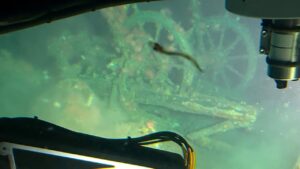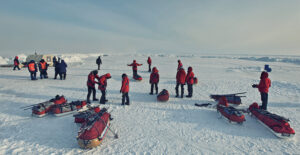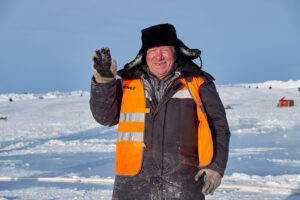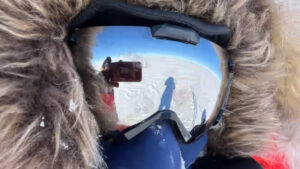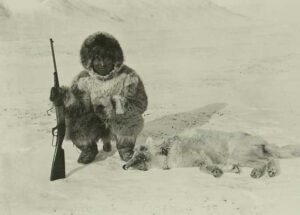Henry Worsley, soldier and Antarctic adventurer, died on January 24th, aged 55
(The Economist) THE compass did not belong to him. But when he felt it in his trouser pocket—and with every stride of his skis over the Antarctic ice, he felt it—it powered him on. When the light was flat, crevasses lurking and nothing before him but “white darkness”, he remained aware of it, his silent companion. If team morale was low in the tent in the evenings, with socks drying at head-height and the winds hurling outside, he would pass it round. It was not much bigger than an old penny, but alive, spinning and jittering, as excited as he was to be so close to the South Pole. For it had been there before, a century earlier. Inside the lid the owner had scratched his initials: EHS, for Ernest Henry Shackleton.
On his three expeditions to Antarctica, in 2008-09, 2011-12 and 2015-16, Henry Worsley went equipped with GPS, video cameras, satellite phones, solar panels, energy bars. No item was more important than the compass. It accompanied him physically only on his first trip, a centenary recreation of Shackleton’s march towards the Pole in 1908-09 which, at 88.23ºS, he had been forced to abandon for weakness and lack of food. On that journey Colonel Worsley took the compass into Shackleton’s hut, from which the trek had started, placing it back among the blankets, boots and golden-syrup tins all perfectly preserved by the dry polar air; and he later also placed it ceremonially at the South Pole, completing what Shackleton had always hoped to do.
Yet there was a Shackleton compass in his head in any case. He collected anything to do with him: books, autographs, cigarette cards. At Grytviken whaling station, in South Georgia, he slept beside his grave. His family gamely encouraged him, accepting that the white continent held him fast. Other loves, such as cricket, paled beside it; even his unusual liking for sewing, which he taught to inmates of Wandsworth prison, seemed part-inspired by the “ditty bags” of needles, buttons and thread that were vital gear on polar expeditions.
Stirrup of patience
It was easy to pinpoint when the obsession had started: at prep school, in the library, as he read of the great explorers and stared, with amazement, at Frank Hurley’s photographs of Shackleton’s ship Endurance listing, like the ghost ship in “The Ancient Mariner”, among towering pack-ice in the Weddell Sea. That third attempt on the Pole had been abandoned, in 1916, almost before it had begun; a distant relative, Frank Worsley, had been the ship’s captain. There lay another reason for the haunting.
For decades, though, he doubted that he was bold enough for the Antarctic. How could he be as decisive as Shackleton, as intrepid and optimistic? Could he, to quote his hero, “Put footstep of courage into stirrup of patience”? Throughout his long and distinguished army career, including commands in Bosnia, “special duties” in Northern Ireland and tours with the SAS in Afghanistan, he would keep comparing himself. Trapped in a café by a violent mob in Bosnia, he psyched himself up for a breakout by asking “What would Shacks do?” Meeting, unarmed, with tribal elders in Helmand to lay the trail for the British army in 2005, he would start by making them laugh at his lamentable Pushtu; Shacks had always believed in the power of laughter. In Afghanistan, camping out in wadis in desert camouflage, he was reading “The Heart of the Antarctic”.
As an army officer, he was deeply impressed by Shackleton’s leading of his men. Nothing, even reaching the Pole, had meant more to him than their welfare; in return, they had trusted “the Boss” completely. It was in Shackleton’s footsteps that “General” Worsley, as his teams called him, insisted on regular hot meals on polar treks and berated himself, as well as them, for idle slips. And the same loyalty to comrades impelled him on his third journey, starting last November, to raise money for “my wounded mates”: the soldiers who had not, like him, returned whole from active duty.
That journey he made alone, intending to be the first to pull a 148kg sledge for 1,100 miles right across the continent, unaccompanied and unassisted, in honour of Shackleton’s abortive bid a century before. He did not mind being solitary. On his two previous expeditions, both heading for the Pole, he had made a point of wandering off each evening to commune with the land and with ghosts. For he did see ghosts, in that extraordinary, mesmerising panorama of blue ice and white peaks: a pair of snow petrels, which he thought might be Shackleton and Scott, and a solar parhelion that might, perhaps, contain their safeguarding spirits. He imagined his hero murmuring advice beside him.
The Antarctic, though, turned on him as fiercely as it had ever turned on them. Whiteouts blinded him. Storms kept him pinned in his tent. The sheer scale of the challenge began to daunt him. Day by day, his audio diary for his website stayed chirpy; but the selfies showed a face increasingly exhausted. Eventually, like Shackleton with his “astonishing decision” at 88.23ºS, he had to admit he had “shot his bolt” and, 30 miles from success, could not go on. Unlike his hero, he left it too late, and died in a Chilean hospital.
In a whiteout, he radioed on Day 24, “one’s head is always bent downwards in reverence to the compass.” It might have been his epitaph.
Originally published in The Economist
Previous on Pythom:
South Pole skier, Henry Worsley, passed away
“Memories of a great friend,” Lou Rudd remembers Henry Worsley
Henry Worsley: Memories and Lessons
#southpole #antarctica #henryworsley

